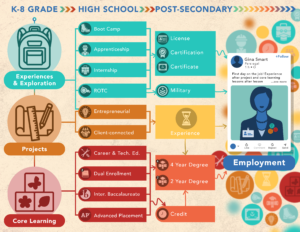Ed Gets High Marks for First 2 Years
The National Journal is debating education grades for the first two years of the Obama Administration. There are the predictable and ridiculous, ‘let everyone do what they want’ comments–we did that for 40 years and created the outrageous gaps that currently exist. Here’s my take:
The Core and related assessments will frame the next decade the way NCLB did the last. We’re six years over due for an ESEA reauthorization and it’s already clear that when it happens, the feds will back off and states will go back to weak and inconsistent accountability.
With Harkin, the coordinated assalt on private enterprise in higher ed moved the administration further from the president’s completion goals.
Scoring of RttT and i3 was embarrassing (e.g., OH & HI over CO & LA) but easy to see how it would be all over the board if some of the National Journal bloggers were included. If renewed, both need language and scoring updates.
For edReformer readers, it’s also worth noting that Karen Cator has the EdTech plan heading in the right direction, but the Department still seems to favor (or significantly overweight) traditional solutions.





[email protected]
Four questions:
1. How do you reconcile individualized and adaptive curriculum with a blanket dismissal of "let everyone do what they want?" Where should individualization and adaptation end? At standards? Could "the land of learn as you please" be a compromise between "the land of do as you please" and "the land of do what we tell you?"
2. Is "The Department gets high marks for a record amount of reform in two years" the same as Student A got high marks for doing a record amount of work or extra credit? I realize that this question is probably better posed to the National Journal, but I'm interested in your take. I've read arguments complimenting Obama on making pragmatic compromises; do you think he's too pragmatic, not pragmatic enough, or just right in terms of both the amount of reform and its quality?
3. Are you not worried that common standards narrow choice and definitions of teacher effectiveness? Help me understand why not. Is there no point in public education by age or readiness at which students can explore a portfolio of options that aren't standardized?
4. How can we come up with framework for strong decentralized accountability? Competitive grants? What else works?
Non-rhetorically yours in reform,
C